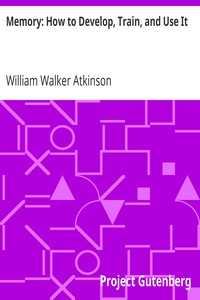Memory: How to Develop, Train, and Use It by William Walker Atkinson
"Memory: How to Develop, Train and Use It" by William Walker Atkinson is a psychological self-help guide written in the early 20th century. The book explores the importance of memory in various facets of life, highlighting methods for improving memory through understanding its processes and utilizing practical techniques. It serves as a resource for readers looking to enhance their cognitive abilities and retention skills. The opening of the book emphasizes the significance
of memory, asserting that it is fundamental to personal success in both professional and social contexts. Atkinson discusses the common misconceptions about memory's development, challenging the belief that abilities are fixed and unchangeable. He introduces the idea that memory can be cultivated through conscious effort and systematic practice. The section outlines the early concepts of memory, distinguishing between remembering, recollection, and remembrance, and sets the stage for delving deeper into specific techniques for memory improvement in subsequent chapters. (This is an automatically generated summary.)
Read now or download (free!)
| Choose how to read this book | Url | Size | ||||
|---|---|---|---|---|---|---|
| Read online (web) | https://sendtokindle.compellingsciencefiction.com/ebooks/41478.html.images | 257 kB | ||||
| EPUB3 (E-readers incl. Send-to-Kindle) | https://sendtokindle.compellingsciencefiction.com/ebooks/41478.epub3.images | 202 kB |
Send
to kindle email: |
|||
| EPUB (older E-readers) | https://sendtokindle.compellingsciencefiction.com/ebooks/41478.epub.images | 202 kB | ||||
| EPUB (no images, older E-readers) | https://sendtokindle.compellingsciencefiction.com/ebooks/41478.epub.noimages | 156 kB | ||||
| Kindle | https://sendtokindle.compellingsciencefiction.com/ebooks/41478.kf8.images | 390 kB | ||||
| older Kindles | https://sendtokindle.compellingsciencefiction.com/ebooks/41478.kindle.images | 359 kB | ||||
| Plain Text UTF-8 | https://sendtokindle.compellingsciencefiction.com/ebooks/41478.txt.utf-8 | 230 kB | ||||
| Download HTML (zip) | https://www.gutenberg.org/cache/epub/41478/pg41478-h.zip | 193 kB | ||||
| There may be more files related to this item. | ||||||
About this eBook
| Author | Atkinson, William Walker, 1862-1932 |
|---|---|
| LoC No. | 28009946 |
| Title | Memory: How to Develop, Train, and Use It |
| Note | Reading ease score: 55.0 (10th to 12th grade). Somewhat difficult to read. |
| Credits | E-text prepared by sp1nd, cm, and the Online Distributed Proofreading Team (http: //www.pgdp.net) from page images generously made available by Internet Archive (http: //archive.org) |
| Language | English |
| LoC Class | BF: Philosophy, Psychology, Religion: Psychology, Philosophy, Psychoanalysis |
| Subject | Memory |
| Category | Text |
| EBook-No. | 41478 |
| Release Date | Nov 25, 2012 |
| Copyright Status | Public domain in the USA. |
| Downloads | 224 downloads in the last 30 days. |
| Project Gutenberg eBooks are always free! | |

